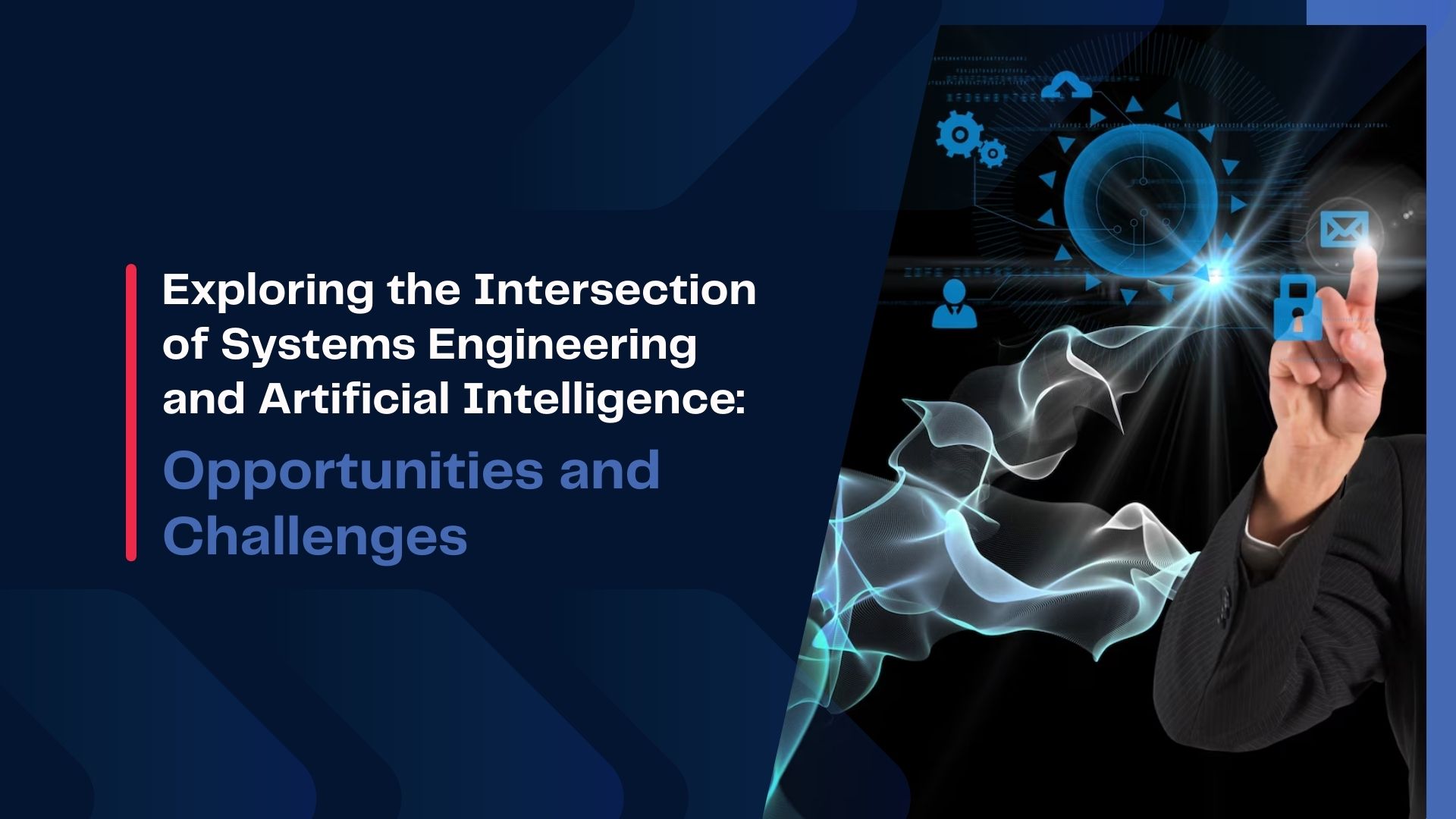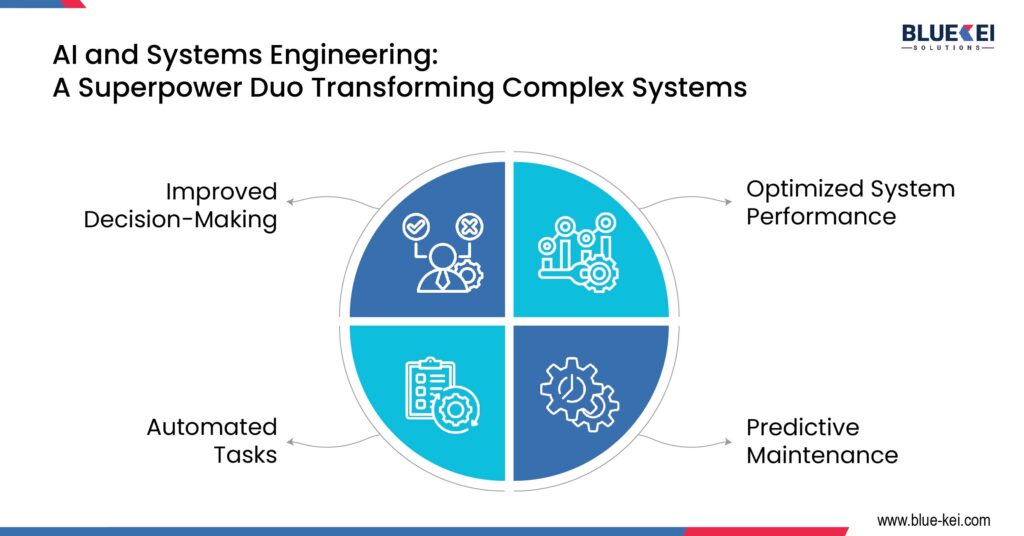Exploring the Intersection of Systems Engineering and Artificial Intelligence:
Opportunities and Challenges
The world’s moving faster than ever! AI is everywhere these days, from smartphones to factory robots. But for engineers who design complex systems like power grids and satellites, AI offers to be their secret weapon!
Systems Engineering: The Mastermind Behind the Scenes
Let us jump into the AI game, but first, let us meet the behind-the-scenes hero – system engineers. They function as the architect and conductor of complex projects. It is a meticulous process that ensures all the intricate parts of a system work together flawlessly; they make sure all the components of a complex system, like a spacecraft or a medical device, function in perfect harmony. Here is a glimpse into their toolbox:

At its core, DDDM involves utilizing data and analytics to inform decision-making processes. Gone are the days of relying solely on intuition or past experiences. Instead, DDDM emphasizes evidence-based decision-making, where insights derived from data analysis drive the course of action. By leveraging various analytical techniques, such as statistical analysis, machine learning, and simulation, engineers can gain deeper insights into system behavior, identify patterns, and predict outcomes with greater accuracy.
- ● Methodical and Structured Approach: They break the work into clear steps or phases, such as planning, design, development, and testing. It is like a well-planned show – each part knows its role for a smooth performance.
- ● Break Complex Systems: Systems engineers break down complex problems into manageable chunks. Think of them as puzzle ninjas!
- ● Collaboration is Key: Systems engineering projects require a symphony of talented engineers working together. They need folks from all engineering fields – mechanical, software, electrical, etc.
AI in Systems Engineering
AI is emerging as a powerful assistant for systems engineers, enhancing the workflow with a range of functionalities. Let us explore how:
- ● Smarter Decisions: AI can analyse vast amounts of data to identify patterns and predict potential problems before they arise. This proactive approach leads to improved decision-making during development, saving time and money, and streamlining the overall process. By gaining new insights from data, AI enables data-driven decision-making that can lead to substantial improvements in project ROI.
- ● Optimizing Systems to the Max: Leveraging AI algorithms, systems engineers can fine-tune a system’s design to unlock its full potential. This translates to significant efficiency gains, with studies by Accenture demonstrating up to a 40% improvement when utilizing AI-powered optimization.
- ● Automating the Mundane: Repetitive tasks are an inherent part of systems engineering, but they can consume valuable time. AI excels at managing these tasks with accuracy and speed. This frees up engineers to focus on the bigger picture – strategizing, innovating, and optimizing the system’s design. It is like giving them extra brainpower to work more efficiently!

Opportunities of AI in Systems Engineering
The combined power of AI and systems engineering paves the way for groundbreaking advancements in the design, development, and management of complex systems. According to the insights shared by INCOSE on the Systems Engineering Research Centre (SERC), here are some exciting areas where this synergy is driving innovation:
- ● Model-Based Systems Engineering (MBSE): AI can enhance MBSE practices by automating model creation, validation, and analysis tasks. This can lead to more efficient and accurate system models, enabling faster design iterations and improved system quality.
- ● Requirements Engineering: AI techniques like natural language processing and machine learning can assist in extracting, analysing, and managing system requirements more effectively, reducing ambiguity and ensuring traceability throughout the development lifecycle.
- ● Verification and Validation (V&V): AI algorithms can automate various V&V activities, such as test case generation, defect prediction, and regression testing, leading to more thorough and efficient system verification and validation processes.
- ● System Optimization: AI-powered optimization algorithms can help identify optimal system configurations, resource allocations, and trade-off analyses, enabling the design of more efficient and cost-effective systems.
Challenges and Considerations: A Reality Check
Integrating AI with systems engineering is not without its challenges. Here are a few to consider:
- ● Data Quality and Quantity: AI models require high-quality, diverse datasets; poor data can lead to inaccurate predictions.
- ● Complexity in Integration: Merging AI solutions with existing systems can be technically complex and time-consuming.
- ● Understanding AI Decisions: The “black box” nature of AI can make it difficult for engineers to understand and trust AI-generated outcomes.
- ● Skill Gaps: A shortage of professionals with expertise in both systems engineering and AI can hinder effective integration.
- ● Ethical and Regulatory Concerns: Ensuring compliance with ethical standards and regulations is essential yet challenging in AI deployment.
Best Practices to Pave the Way
So, how can we navigate these challenges and unlock the full potential of AI in systems engineering? Here are some best practices to consider:
- ● Think Big Picture: Take a systems thinking approach, considering how AI integration will impact the entire system.
- ● Governance is Key: Effective governance is crucial for managing AI risks. This includes establishing clear ethical guidelines and ensuring clear accountability for AI decisions.
- ● Collaboration is King: Bridging the gap between systems engineers and AI experts is crucial. Foster a collaborative environment where both parties can learn from each other and work towards a common goal.
Putting Theory into Practice
AI is not just some futuristic concept; it is already making waves in the world of systems engineering. Here is an inspiring example:
- ● Designing Next-Gen Aircraft: The aerospace industry is leveraging AI to design and develop next-generation aircraft. AI algorithms can optimize wing shapes and fuel efficiency, leading to more sustainable air travel.
The Future is Powered by AI!
The future of AI-powered systems engineering is looking bright! Here are some emerging trends to keep an eye on:
- ● Explainable AI (XAI): Researchers are developing XAI techniques to make AI models more transparent and understandable. This will be crucial for building trust in AI-driven systems. Imagine being able to see the logic behind an AI decision, not just the outcome!
- ● Human-AI Collaboration: The future lies in human-AI collaboration, where humans and AI work together to leverage each other’s strengths. Imagine engineers using AI as a powerful tool to augment their creativity and problem-solving skills
The Final Takeaway: Embrace the AI Revolution!
The integration of AI into systems engineering brings both great opportunities and challenges. By following a strategic approach that emphasizes planning, collaboration, and responsible development, we can unlock the immense power of this technology. So, are you ready to join the AI revolution in systems engineering? Let us work together to design and build the future!
At BlueKei, we understand the transformative power of AI in systems engineering. Our team of experts brings together a deep knowledge of systems engineering and the latest AI know-how. We are passionate about helping organizations leverage AI to:
- ● Optimize system design and performance.
- ● Enable predictive maintenance and reduce downtime.
- ● Automate repetitive tasks and improve efficiency.
- ● Develop robust and ethical AI-powered systems.
Whether you are developing next-generation medical devices or working on complex transportation networks, our team can partner with you to design and implement a customized AI solution that aligns with your specific needs and goals.
Ready to unlock the power of AI in your systems engineering projects?
Contact experts and systems engineers at BlueKei to know more about solutions. Let us discuss how we can help you harness the potential of AI and revolutionize the way you design, develop, and manage complex systems.
If you are interested in understanding how to adopt systems engineering and model based systems engineering practices within your organization, reach out to BlueKei Solutions team at info@Blue-Kei.com. We specialize in systems engineering consulting, project executions, process adoptions such as compliance to ISO15288, ARP 4754A, ISO 42020, digital transformations. We can also conduct capability development workshops which are experiential and tailored to your needs. With systems engineering adoption you can address the complexity, manage evolving risks and bring transformation in communication within your organization through digitalization and create the digital thread.

